++Iz++
OVER THE RAINBOW // and free
![]()
» Listen to Icelandic Music
» Bruddah IZ Tribute Page
» Watch Over the Rainbow clip on YouTube
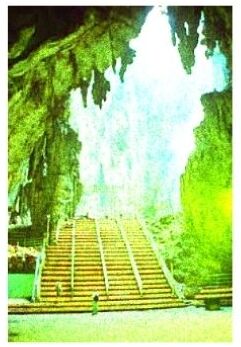
Pictures of Little India Kuala Lumpur Malaysia
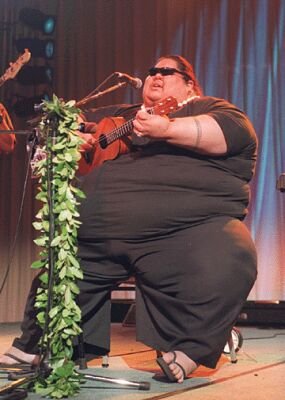 LATER THIS YEAR (AROUND THE MIDDLE OF THE YEAR 2007, TO BE MORE SPECIFIC) MILLIONS OF PEOPLE AROUND THE WORLD WILL MOURN THE DEATH OF ONE OF THE MUSICAL GIANTS OF THE 20TH CENTURY, ISRAEL KAMAKAWIWO'OLE. Among the number of greats who arose in the field of "world music" in the 20th Century, few have shined as bright, or aroused such passionate devotion from their followers, as the one they call "Bruddah Iz" -- Israel Kamakawiwoole. Over there in Jamaica they had a reggae singer called Bob Marley who is worshipped as a god -- he kind of compares with Israel Kamakawiwoole in terms of his stellar star appeal. In Hong Kong Bruce Lee came to symbolise the passions and ambitions of an entire people -- while being a singer rather than a movie star, Israel Kamakawiwoole was in the same kind of league. Like Marley and Lee, Bruddah Iz possessed a personal chemistry which was almost Messianic. As Brudda Bu wrote on his ukele page:
"On a personal note, Bradda IZ was a dear friend of mine. I have never met anyone like him. He had an aura, an energy, or as the Hawaiians say, MANA about him that was unique. The power of this mana was most obvious when he was on stage. The last time I saw him was at a concert here in California. The audience was on it's feet, waiting for the curtains to open and for IZ to sing. We were all cheering and quite excited. Suddenly, the music started, the curtains opened, and there was Bradda, that giant man with his little ukulele...and that golden voice, the voice of an angel. My knees went weak and tears started to roll down my cheeks, the aloha from this man was so powerful. I looked around at the audience and I discovered I wasn't alone. Everyone that I saw had tears in their eyes, Akaka Falls da makas."
LATER THIS YEAR (AROUND THE MIDDLE OF THE YEAR 2007, TO BE MORE SPECIFIC) MILLIONS OF PEOPLE AROUND THE WORLD WILL MOURN THE DEATH OF ONE OF THE MUSICAL GIANTS OF THE 20TH CENTURY, ISRAEL KAMAKAWIWO'OLE. Among the number of greats who arose in the field of "world music" in the 20th Century, few have shined as bright, or aroused such passionate devotion from their followers, as the one they call "Bruddah Iz" -- Israel Kamakawiwoole. Over there in Jamaica they had a reggae singer called Bob Marley who is worshipped as a god -- he kind of compares with Israel Kamakawiwoole in terms of his stellar star appeal. In Hong Kong Bruce Lee came to symbolise the passions and ambitions of an entire people -- while being a singer rather than a movie star, Israel Kamakawiwoole was in the same kind of league. Like Marley and Lee, Bruddah Iz possessed a personal chemistry which was almost Messianic. As Brudda Bu wrote on his ukele page:
"On a personal note, Bradda IZ was a dear friend of mine. I have never met anyone like him. He had an aura, an energy, or as the Hawaiians say, MANA about him that was unique. The power of this mana was most obvious when he was on stage. The last time I saw him was at a concert here in California. The audience was on it's feet, waiting for the curtains to open and for IZ to sing. We were all cheering and quite excited. Suddenly, the music started, the curtains opened, and there was Bradda, that giant man with his little ukulele...and that golden voice, the voice of an angel. My knees went weak and tears started to roll down my cheeks, the aloha from this man was so powerful. I looked around at the audience and I discovered I wasn't alone. Everyone that I saw had tears in their eyes, Akaka Falls da makas."
As I mentioned before, later this year (June 2007 to be more precise), millions of people around the world will mourn or rather celebrate the untimely death of one of the greats of World Music -- Israel Kamakawiwoole. Untimely, because the Bruddah Iz died at the age of 38, at the peak of his career and popularity -- it was the same tragic die young scenario which also hit Marley and Bruce Lee. It leaves you wondering: "what if?"... what if he had remained alive, just how far could he have advanced the course and cause of Hawaiian music. According to the folklore, Israel Kamakawiwoole was born on May 20, 1959, on the island of O'ahu at Kuakini Hospital to Henry Kaleialoha Naniwa and Evangeline Leinani Kamakawiwoole. He was raised in the community of Kaimuki on the outskirts of Waikiki where his parents had met and married. He began playing music with his older brother Skippy at the age of 11, being privy to the music of the great Hawaiian entertainers of the time such as the likes of Peter Moon, Palani Vaughn, and Don Ho, who frequented the establishment where Iz's parents worked. His uncle was Moe Keale, a living legend in Hawaii (who later died of a heart attack at a young age. As fate would have at, fatal heart attacks suffered at a young age would become a pivotal theme in Israel's life -- afflicting not only his father and his close comrade and brother Skippy, but also himself. But we will come to this later...)
In his early teens, his family moved to Makaha. There, he met Louis "Moon" Kauakahi, Sam Gray, and Jerome Koko. Together with his brother Skippy they formed the Makaha Sons of Ni'ihau. As the aforementioned Brudda Bu wrote: "One day when he was 15 years old, Israel was sitting at a picnic table on Makaha Beach playing his ukulele when Jerry Koko stopped by to talk story. Jerry invited Israel over to his house to kanikapila (play music). He then met Moon Kauakahi and Jerry's brother, John Koko. Israel told the boys about his brother, Skippy, and how he could play guitar. After playing togther for awhile, the boys decided to start a group and the Makaha Sons of Ni'ihau were born. First consisting of Israel, Skippy, Moon, Mel Amina (Israel's cousin) and Sam Grey, their first big break was being on the Jerry Lewis telethon."
Their first big break indeed came on the Jerry Lewis telethon, but before that auspicious occasion, the Makaha Sons of Ni'ihau developed their skills the usual way: playing at backyard parties. After their first "public gig," Nanakuli High School's May Day Program, the group chose the name their origins and reflected the Ni'ihau heritage of the Kamakawiwo'ole brothers.

medical trial
kagoshima

porn japan
tokyo
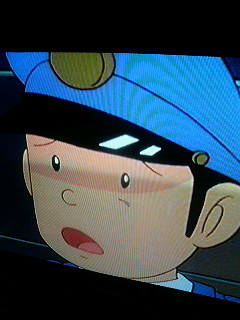
lock up
tokyo

lesbian japan
niigata/fuji/tokyo
u p w a r d
r i s e
FROM THAT FIRST APPEARANCE ON THE JERRY LEWIS TELETHON, THE ONLY WAY WAS UP. The Makaha Sons recorded No Kristo in 1976 (for a translation of the lyrics of this traditional Hawaiian ode to Christ, click here). Five more albums during as many years, though Skippy's death of a heart attack in 1982 came as quite a blow to his younger brother. The group soldiered on, to become Hawaii's most popular traditional group with breakout albums like 1984's Puana Hou Me Ke Aloha and its follow-up, 1986's Ho'ola.
Israel Kamakawiwo'ole decided to begin recording on his own with 1990's Ka 'Ano'i, which became the most popular Hawaiian album of the year. Though he continued his solo career, by 1991 he had recorded with the Makaha Sons of Ni'ihau again, and that year's Makaha Bash 3 set still more records in Hawaii, thanks in part to the single "Broken Promise." Another Makaha LP, Ho'oluana, appeared in 1992, though it was the last with Israel. His second solo effort, Facing Future, appeared in 1993.
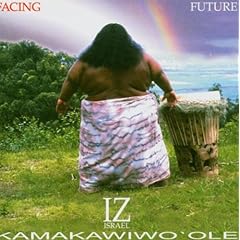
Facing Future by Israel Kamakawiwoole: Click picture to purchase
Included among the tracks on Facing Future was a demo tape version of that popular American classic, "Over the Rainbow." Upon release the song took on a life of its own. The familiar melody played in hotels and on rental car radios, in restaurants and bars. Many were moved to tears. If it didn't give you "chicken skin," you were legally dead, as one reviewer commented. The song resonated even more for locals. Some heard its kaona, or hidden subtext, to reflect the sadness Hawai'i felt about having its lands illegally annexed by the United States in 1898. Those who had seen him in concert knew he ended each show with the words, "My name is Israel Kamakawiwo'ole, I am Hawai'ian." Israel was one of only 1, 500 full-blooded Hawai'ians left in the world. He was pure, and so was the recording. It bounced around the islands for the next three years.
And then one afternoon, Santa Monica KCRW radio host Chris Douridas cued up "Over the Rainbow" as part of his program Morning Becomes Eclectic, to cheer up listeners on a rainy day. After it faded out, Douridas announced the 800 phone number on the back of the Facing Future CD. In two days, Mountain Apple received over 2,000 calls from southern California, people crying and asking about the music, many of them stuck on the freeway when they heard it.
Movie producer Martin Brest bought the rights for use in his film Meet Joe Black. As the end credits rolled, movie audiences stayed in their seats to listen to "Over the Rainbow." One of America's most recognizable melodies, first made popular by Judy Garland, the tune had always embodied optimism, depicting a world where dreams really do come true. Israel's version was something else entirely: haunting and delicate, stripped down to a lone voice and a ukulele, an unexpected minor chord contrasting, almost unconsciously, against the happy lyrics of wishing upon a star. After the film's premiere in Hawai'i, people were sobbing in the theater.
Producers bought the very same song for Finding Forrester, Made, The Big Bounce, and 50 First Dates, and episodes of ER, Providence, Charmed and Party of Five. The song was aired in an eToys ad during the Super Bowl, and then in commercials throughout Japan, Europe, Australia, New Zealand.
"Rainbow" came to personify Hawai'i to the outside world. Celebrities publicly announced their love of Israel's music: novelists, actors, directors, baseball players, sumo wrestlers. Bruddah IZ was the state's first artist in history to have an album certified gold. Posters and calendars of his face decorated record stores around the world. "Over the Rainbow" became the No. 1 bestselling song downloaded from the World Music section of iTunes. Israel had produced the most recognizable and beloved Hawai'ian song in 50 years. And he didn't live to see any of it.

E Ala E by Israel Kamakawiwoole: Click picture to purchase
1995's E Ala E featured a reunited voice from the grave duet with Skippy, resurrected Lenon-style by studio technology. As one reviewer of the album wrote: "E ALA E may have many meanings but to Iz the meaning was to rise up and acknowledge your heritage if you are Hawaiian. I lived on Oahu for 4 years and got to see Iz in concert, to listen to his musings on life, on being Hawaiian, on being human. His was a soul we shall not see again, perhaps, in this lifetime of ours. This CD opens with the title song and immediately captivates the listener with the power of Iz's simplicity and aura. It is impossible to not FEEL what Israel is conveying to his people, nay, to all of us....To rise up and be counted for who each of us is, who each of us can be if we simply beleive in ourselves as souls. This is my second favorite CD of Iz's after Facing Future. It will steal your heart if you let it, so put it on, sit back, feel Hawaii, feel Hawaiian, and feel the power of this gentle giant. Then, once you have known the beauty of what Israel created, buy everything he recorded and learn to miss him as I do. Aloha niu loa, Koka."
Israel continued to win awards and sell very well with 1996's N Dis Life, but his ballooning weight problem (at times, he weighed over 750 pounds) caused his early death at the age of 38.
(source: John Bush, All Music Guide.)
Over a period of 15 years, The Makaha Sons of Ni'ihau recorded 10 albums and won numerous Hoku awards (the Hawaiian Grammy). They started the Makaha Bash, a huge concert at the Waikiki Shell every year on Memorial Day weekend.
From 1976 throughout the 1980s, the Hawaiian contemporary band gained in popularity as they toured Hawai'i and the continental United States and released 10 successful albums.
Such are the facts, as recorded by Wikipedia and other sources (and I am grateful for the lifts.) Such are the facts, but what of the man -- more importantly, what of the spirit behind the man? Even more importantly, what of the music behind the spirit behind the man -- the music of the man's soul. This is what this website intends to find out.
 medical trial kagoshima |
 porn japan tokyo |
 lock up tokyo |
 lesbian japan niigata/fuji/tokyo |
o n l i n e
r e s o u r c e
BUT FIRST, BEFORE WE START, HERE IS A SUMMARY OF SOME OF THE ISRAEL KAMAKAWIWIOLE RESOURCES ON THE INTERNET, FROM LYRICS TO TABS TO CLIPS ON YOU TUBE TO PLACES YOU CAN GET FREE HAWAIIAN ALBUMS:
Ahi Wela (Fire Of Love) -- Lyrics in Hawaiian and English.
Ahi Wela / Twinkle Twinkle Little Star -- Listen to Ahi Wela and Twinkle Twinkle Little Star for free on Rhapsody Online.
Ahi Wela / Twinkle Twinkle Little Star -- Listen to Ahi Wela and Twinkle Twinkle Little Star on Last FM.
Ahi Wela -- Live in Concert on Rhapsody Online.
E Ku`u Morning Dew -- Lyrics in Hawaiian and English for this classic song, words by Larry Kimura, music by Eddie Kamae.
E Ku'u Morning Dew Live -- E Ku'u Morning Dew performed live on You Tube.
Hawaii 78 Lyrics -- Lyrics to Hawaii 78 and other Israel Kamakawiwo Ole' songs.
Hawaiian Fan Magazine (Japanese language) -- Hawaiian Fan‚Í‘f“G‚ȃnƒƒCƒAƒ“ƒ~ƒ…[ƒWƒbƒN‚Æ ƒtƒ‰‚Ì‘‡î•ñŽB
Hula Lyrics -- A NY Times article including the lyrics to Papalina Lahilahi, 'Ahulili and
Mauna Loa.
Matt's Hawaiian Paradise -- Japanese language Hawaiian radio from the heart of Setagaya.
Keali'i Reichel -- Keali'i Reichel sings Kawaipunahele.
Ohta live on YouTube -- Ukulele master Ohta-san performs HAWAII on YouTube.
Pearl Jam perform Hawaii 78 -- Classic song about the woes of urbanization performed by Pearl Jam at the Aloha Stadium.

medical trial
kagoshima

porn japan
tokyo

lock up
tokyo

lesbian japan
niigata/fuji/tokyo
p e r s o n a l
t r i b u t e s
LIKE OTHER NATIONAL HEROES WHO PERSONIFIED THEIR COUNTRY IN THE MEDIA (BRUCE LEE FROM KONG KONG COMES TO MIND), ISRAEL KAMAKAWIWO'OLE HAD THE POWER TO AFFECT PEOPLE HE MET ON AN ALMOST SPIRITUAL LEVEL. To many of his fans, he literally was a god... or at least close to being one. On Hawaiian Stories site, Myles wrote:
"Many of you already know the tragic and complex story of one of Hawai'i's great musicians and cultural leaders, Israel Kamakawiwo'ole, affectionately known to many as Braddah IZ. To the uninitiated, he was simply an overweight musician who died at the age of 38 from respiratory complications due to his obesity. To those of us who grew up with his music, he was larger than life in every way. In 1993, after completing 9 albums with the Makaha Sons of Ni'ihau as well as 2 on his own, he found himself hopelessly on welfare. He knew his days were numbered and made the difficult decision to part with the Makaha Sons and try to secure some type of future for his wife, Marlene and especially his daughter, Kawehi. It wasn't long before he had moved from welfare dependence to a six figure income on his own label Big Boy Records. This move to maturity was evident not only in the decisions he made for his family but in the way he communicated to the people of Hawai'i, especially the young people. As a rambunctious youth, he got into his fair share of trouble and dabbled in drugs as did most of his peers. During these later years he often took time during performances to tell kids to stay away from drugs and in reference to the increased gang activity in the Islands, once made the statement, "Handkerchiefs are for wiping the sweat from your face...not for hanging out of your back pocket." He also spoke of the sovereignty movement and his hopes for the future of native Hawaiian people. It was as if he was making the time he had left, count. He always spoke from the heart, like a brother, or a father to his children. In his CD Facing Future, he wrote:
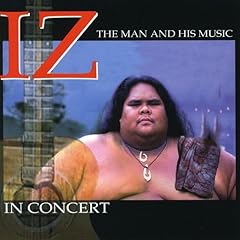
IZ The Man and His Music Live by Israel Kamakawiwoole: Click picture to purchase
"We celebrate the legacy of Braddah Iz
with the release of his latest work IZ, The Man and His Music."
This live album (recorded in the United States) includes songs like "Ahi Wela", "Hene Hene Kou Aka", "White Sandy Beach", "Maui Hawaiian Sup'pa Man", as well as that evergreen midPacific classic, "Hawai'i Aloha". According to Amazon: "This compact disc is being released on IZ's birthday, as a gift to his fans from his 'ohana. The aloha he felt for all of his audiences was passionate -- whether they were seeing him in concert or just listening to one of his albums. IZ's life is in his music."
Blakes, a recovering classical movie buff, wrote: "In an airport in Botswana, awaiting a plane to Johannesburg (delayed for several hours), I observed a distinguished-looking man, sitting completely relaxed, with a smile on his face, listing to his iPod. Finally, out of boredom I commented about how un-stressed he seemed to be; he promptly passed over his earphones. WOW! It was Iz singing "Over the Rainbow" (a song I am completely and thoroughly sick of!) Of course, his version was familiar and for the first time in years, I loved the song. Unfortunately, I then forgot the artist's name. Thank goodness it came back to me.
"Bought this CD at probably the last Tower Music Store in the nation, along with 15 others (all classical) and can't stop playing it. Right now I'm in the process of buying this album for a friend, along with all the rest of his collection.
"So long, Beethoven! (Not really, but this is a whole new wonderful addition to my listening life.) I think IZ belongs in every top-notch music portfolio."
MISTER ASIA
Contact us by email: coderot@gmail.com
phone: (090) 6039-9341 (JAPAN)
